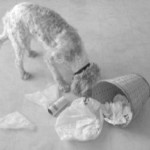My wife and I have always had dogs, and at times, we have had up to three of them. So, we have plenty of stories of the interesting things dogs eat and do with their mouths. For example, one day I had our cute little Cavachon (Scout) on a walk out in the woods on a sunny winter day. The snow was fairly deep so we followed deer trails as we walked. I’d estimate that by the time we completed our two hour walk, Scout had consumed his body weight in deer droppings. He devoured those little delicacies like I devour chocolate covered coffee beans. On another occasion in the summer, he emerged from under a bush with a bird carcass that was badly decomposed and rancid. Given their eating habits, is it even remotely possible that a dog’s mouth could be cleaner than a human’s? The simple answer is no. This myth may have come about as people frequently see dogs lick their wounds, which wounds rarely get infected. It’s possible that the constant licking helps clear away dead tissue on a wound and that might help promote healing, but a dog’s mouth is by no means “sterile” as some think. One study by Rayan and colleagues (1991) compared human and animal mouth flora (flora is the total amount of bacteria and other microorganisms in or on the body). Following their study, the authors concluded “Human oral flora contained the smallest number of bacteria followed by dog and cat oral flora, respectively”. It seems logical, since most humans brush and floss their teeth once or twice a day, and unlike humans, dogs will eat almost anything they find. However, many bacteria are species specific, so you’re more likely to get sick if you kiss your son or daughter than if you kiss your puppy.
Reference:
Rayan G, Downard D, Cahill S, Flourney D: A comparison of human and animal mouth flora. Journal of the Oklahoma State Medical Association (1991), Vol 84, pps. 510-515.

